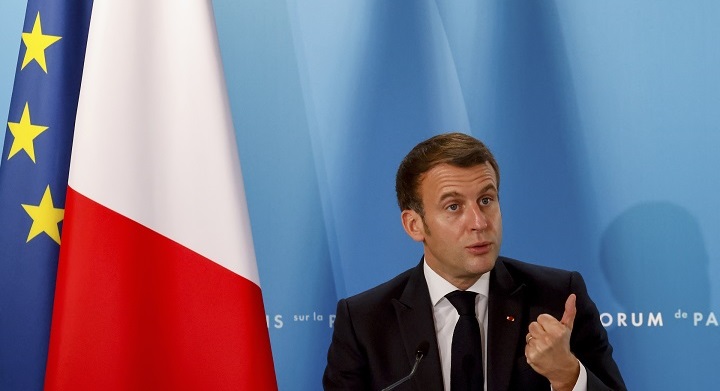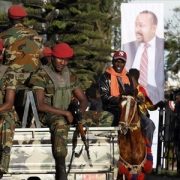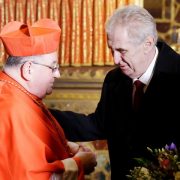
In a crucial moment of history, when the next US president, Joseph Biden, is about to assume office, and may spin US-EU relations in a different direction, French president Emmanuel Macron gave an important interview. His method: it is necessary to think big, otherwise nothing will be resolved.
A crucial element was European defense. The EU has been feeling for years that NATO has fallen into a political slumber. The one issue, hotly debated, is expenditure. The US presses EU countries to spend more, and buy more American equipment, thus boosting exports. Europeans drag their feet.
In fact, NATO can’t become the excuse for Europeans to buy more American products and make up with military hardware the US imports of European consumer goods. The crux should be the future purpose of NATO, and from there one can budget expenditures. After the end of the Cold War, NATO’s goals have been unclear and perhaps this is one thing that Biden could address in the next months.
Short of this, Mr. Macron calls for a European defense, and a more united strategy. This would entail a greater political union (the harbinger of a strategic unity, otherwise who thinks for whom?) of the EU. Without a political union, a united defense would doze off like NATO now.
To move towards greater political unity, it would be enough if France were to devolve half of its national powers to the EU. If Mr. Macron doesn’t, as he probably can’t, everything becomes a difficult Babel of thoughts to say practically: I, France, want to lead Europe without ceasing to be France. The plan didn’t work with Napoleon; can it work now?
Moreover, Mr. Macron warns about all our problems… pollution, overpopulation. These are true and urgent issues, but what can be done concretely and positively, not just negatively (do not spoil the planet, do not have children, et cetera)?
“Negative” international agreements are certainly necessary, limiting carbon emissions for instance, but historically they have always had a limited scope. To move the needle of action one needs proposals for development, positive growth.
Here, there is no need to reinvent the wheel.
How did China really emerge on the international stage? It was a railway project from Beijing to Madrid, the Belt and Road Initiative, BRI, and with large investments in the development of its own technology. America has so far led modern technological revolutions, policies of open markets, and a system of risk investment.
Funds invest in promising new companies but pull the plug on those not performing, favoring the ones giving results. In the process, in America, people lose their jobs (if employed in non-performing companies) without too much fuss.
Why wasn’t this process transplanted to Europe? Because the banks and the funds cannot at will shut down inefficient companies for fear of creating unemployment. Then in Europe, because if failing companies cannot simply close down, new companies are not born and innovation migrates to the US or China.
The Economist called for a technological grand alliance of democracies against the Chinese on going fast moving technological catch-up and confrontational policies. This in fact is not just a plan, an idea, but it is already happening as no democratic country fully trusts China. The issue is only to formalize the trend with some agreements easing technological collaboration between signatories and barring further collaboration with China. This could have immense implications and would put European and NATO issues in a different perspective.
The EU was basically invented by the US at the close of World War 2, to end centuries of European wars and create a front against Moscow. Now the same situation stands, basically, only the international environment is more complicated. But without the US support, the EU would basically fall apart and the continent would slide back into thousands of clashes.
The EU, with the US support, would need huge projects that give impetus to Europe, such as an Oslo-Cape Town railway. It is necessary to dismantle the bureaucracy in European countries hindering market freedom. Around this tree of grand projects, market liberalization, and “positive thinking,” one can and must hang limits on pollution and overpopulation.
But if there is no positive element, the negative element alone (resembling the old “repent your sins!”) has never worked. In religious terms: hell can scare people from sin, but to move one to good behavior, the promise of paradise can work wonders.
Here too China is an example: America is tearing itself apart about who the new president is, meanwhile it missed a mega trade agreement between China and American allies in Asia.
Moreover, a list of concrete ideas proposed that give traction to a new US-EU relationship.
Here:
- EU state members should devolve fiscal, educational, and security state powers (create a European FBI) in Brussels
- Promote development of an integrated Indian subcontinent (the area with greatest overpopulation and increasing pollution of the planet)
- There should be a US-EU free trade area with fixed dollar-euro fluctuation
- An Oslo-Cape Town and Djibouti-Dakar transport-logistic development project (vertical and horizontal integration for Africa)
- Promote a free trade area around Israel in the Middle East
- Promote a free trade area with Asian countries with free markets and politics
- Promote free trade and free politics in China and with China
Logistic infrastructures are not just financial burdens. Railways, built with modern Musk’s hyperloops, like the Japanese Shinkansen, the French TGV or the Chinese fast tracks, are the blood systems of development. They end up in stations, with depots, at the center of the city and make cities. Around there, people set up shops, offices, houses – something that airports can’t produce for the planes’ security concerns.
These could be an engine of a new wave of global development funded by private companies listed in Wall Street, the most sophisticated financial market in the world, and held up by political agreements to guarantee those new tracks.






Problem is money. lots os money.
Grazie Francesco, molto interessante; Stati Uniti d’Europa in stretta collaborazione e free trade da USA a India e da Oslo a Cape Town, la rete ferroviaria veloce come circolazione saguigna nutrimento e visione del Progetto. Mi resta un po’ sfumato l’ultimo punto, quello sul free trade con la Cina, sia pur accompagnato da crescente freedom politico interno in quel paese; mi pare in generale che questo affascinante progetto di “Grande Occidente”, West-East + North South, cozzi fortemente con la strategia cinese che lavora ad un grande cuore duro che si espande nella frammentazione dell’Occidente (il bilateralismo Trump sembrava fatto su misura a questo fine). Però concordo che se non sei forte non puoi neppure pensare di essere “attore” trainante di una strategia di pace globale. Le sfide: 1) come combinare questo innestando sul nucleo forte Occidentale una serie di agganci di mutuo interesse cooperativo con la Cina, che vedrebbe in questo rivolgimento di prospettiva rispetto ad una logica di dominio mondiale a medio-lungo termine?
2) gli USA post trumpisti fino a che punto accetteranno un’Europa che non solo collabora nelle spese della difesa, ma anche come soggetto politico ed economico forte? (alleati e concorrenti, per esempio le grandi piattaforme di dati)
3) come rimpastare una Francia post-Napoleonica? Ad esempio, l’armamento atomico ? 😉
Per carità di patria, evito (ma solo momentaneamente) di pensare all’Italia in tutto questo 😳😊